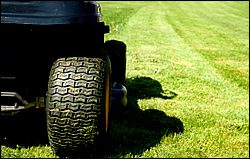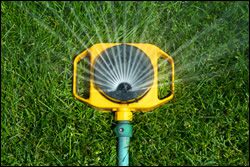Lawn Care Operations
By Greg Watlington
There have never been so many Lawn Care Operations (LCO) in the Franklin area. All it takes is one mid-morning drive around town to see that every 4th or 5th vehicle is an LCO crew!
With the influx of so many new companies, choosing the best company for your needs can be a daunting task. So whether you are looking for a new LCO to care for your property, or you are looking to maximize your dollar spent with your current LCO, we’ll look at five topics that can help you avoid pitfalls and improve the working relationship with your current LCO.
There is one important theme to remember; assume nothing. Always ask for references, and be listening for friends or colleagues who are having great experiences with their LCO. You will want to hire a company that cares about your lawn and landscape – not just your checkbook. There are great Lawn Care Operations in the Franklin area both large and small, and below are some pointers to help you weed out companies you don’t want to work with.
 1. License and Insurance
1. License and Insurance
A great first step to narrowing the field is to ask about their business license and insurance. Anyone who is serious about earning your business is going to obtain a business license in their home county, pay taxes, and be insured to protect not only themselves but you as well.
The business license is easy. Just ask to see a copy of their business license. The same applies for insurance, but just for reference, a one million dollar liability policy is pretty standard for smaller LCOs, larger companies may have more liability, and therefore more coverage. What is important here? Make sure they can take care of you if they cause you harm in some way. The only thing worse than a client or client property involved accident is a client involved accident where the client is left in a financial bind because the LCO was not covered.
If you are hiring a landscaping company to do a large hard-scape or design install, be sure and ask about their bonding. This is insurance that makes sure your job gets finished no matter what happens to them. The bond amount should be equal to or greater than the bid price for your project. It seems ironic, but bonding is all the more important when hiring a small company that may be bidding out of their league and could get swamped by the job (Of course, they may very well complete the project to spec, on budget, and on time.).
2. Herbicides and Pesticide Safety
In the state of Tennessee, anyone who kills any plant or insect for hire is required by law to have a charter for pesticides and herbicides. Yes, the same thing you can go to your local home and garden store and buy yourself is indeed regulated by the state government when it is involved in a paid service. The legal term is “custom application”. Basically, no one (not your neighbor, not your best friend, not even the great guy or gal who’s been taking care of your lawn for years) can apply any herbicide or pesticide for hire without the proper charter and license. This includes, but is not limited to “organic” methods such as 20% vinegar as a weed-killer.
Why does this matter to you? Most of the pest control products used on and around lawns today won’t kill or maim you today (with the exception of that 20% vinegar!). However, when these chemicals are used improperly, they can cause great damage to the environment, and to the health of the person applying them. Just as important is realizing that improper use, even when to a minor degree, can jeopardize the health of you and your family or employees. If you ensure that the company applying the chemicals has gone through the process of obtaining a charter, and each applicator has obtained an applicator’s license, then you have done all that you can do to make sure these horticultural helps have been used in as safe a way as possible.
One thing to remember: Just because a company has not obtained a pesticide or herbicide charter, doesn’t mean you shouldn’t hire them. There are plenty of locally owned and operated companies around town that function solely as lawn and garden chemical applicators. These companies will gladly work in partnership alongside an LCO that doesn’t apply herbicides or pesticides when taking care of a property. Hiring a separate chemical application company is a particularly great choice, because these applicators are not rushing through your chemical application (and risking an unsafe application) just so they can get back on the mower at the next client down the list. They are not concerned with anything but your soil chemistry and biology, so they can give you the best possible results over time.
One word of caution: Be wary of any chemical company that seems to have a large sales staff. They often have hard sale quotas and will push applications when they are not appropriate just to generate sales. As a rule, you have to be “on your toes” a bit more with a national chain. Whoever is pushing the sales people to generate revenue doesn’t know you and most likely has never seen your lawn. Their chemicals are as good as anyone else’s, just educate yourself as to what your lawn needs, and don’t let them up-sell you into treatments that you don’t need (fertilization in June, and in the fall when overseeding – anything more should be need-based according to your individual lawn and turfgrass and is usually indicated by analyzing a soil sample).
There are two important “Organic” exceptions in the state of Tennessee that can seem to fall in the grey area of chemical application. Corn Gluten Meal acts as a wonderful “Pre-Emergent” – meaning that it prevents seeds from germinating. You would put this down in the late winter before the weeds begin to emerge. It is considered a soil amendment, and as such, does not require a license for custom application. The other “Grey Area” exception is Compost Tea. It is a wonderful alternative to synthetic fertilizers. It can be applied without a license and is wonderful at cultivating a healthy, productive (for your lawn) soil biology.
 3. Breaking Down The Cost
3. Breaking Down The Cost
As an LCO operating in the Franklin area, I have potential clients tell me all the time that they just wish their LCO would spend more time on their yard. These same potential clients then respond to my weekly maintenance estimate by trying to talk me down five or ten dollars. What they don’t realize is that most licensed LCOs are already giving their bottom-line estimate. We know that the high gas prices are hard on everyone, and we are doing our best to accommodate.
Here’s a little background on the wide gaps between estimates different companies will give you. Remember the first bit about license and insurance? As most of you know, operating costs of a legitimate company are much higher than that of unlicensed “moonlighters”. If you are going to hire someone who is contributing back into the local economy and government and is insured in case of an accident, it will cost you more. Most companies have to bill about $42.50 per man-hour to maintain a healthy business. This is not an unreasonable amount, and the margins get tighter as the cost of gasoline and diesel rise.
So if you are unhappy with the work your current LCO is doing, think back to how you came about paying what you are paying. Did you talk them down from their estimate? It goes against every grain of our bargain-loving brains, but you may want to approach your LCO and ask them what it would take for them to spend another fifteen minutes on your property so that they elevate their level of care. Sometimes the question is enough to get a complacent LCO kicked into high gear. Other times, you will realize that when you talked the LCO down from their original estimate, you crippled their ability to give you extra time on your property when needed.
One more thing about cost: If you feel like your current LCO is letting the quality of their work slip, give them a call and let them know before you “abandon ship”. After that first awkward feedback session, you will often find that you have a stronger working relationship and more respect for an LCO that handles feedback well. Remember, like any service industry, feedback is critical to helping us provide the best value for your dollar.
4. What About Organics?
Isn’t it all the buzz these days? This is in fact, one fad where the hype cannot express the potential greatness of organic lawn care! Organic lawn care, when done well, can be absolutely safe for your family, employees and clients, the environment, your LCO crew, and you. Sometimes when we are in pursuit of the perfect landscape, we forget the fact that everyone that sets foot on our property has assumed a trust in us to provide a landscape that is not only beautiful, but safe as well. While the benefits are both wonderful and plentiful, there are so many frequent questions about organic lawn care d that we can only scratch the air that floats above the surface in this article, so here’s the basics of what you should know.
Ask your LCO if they are equipped to care for your property solely with organic methods. We are in a time of transition where organic lawn care is becoming more popular, but regulation and education are not keeping pace. The best way to know if your LCO is capable is to educate yourself on the topic before you broach the subject with your LCO.
When we talk about organic, we are generally speaking of non-synthetic materials (naturally occurring) that help the lawn chemistry and biology come into balance. It is a harsh truth that when you use synthetic herbicides and pesticides all of the time you will need a lot of applied nutrients throughout the year to keep grass looking healthy. We call this “propping up” the soil. Basically, with most synthetic herbicides and pesticides, you are, in varying degrees, sterilizing the soil. At that point, when you stop applying nutrients, the soil cannot take care of the plant life on its own, and things start to go badly.
On the other hand, with organic lawn and garden practices, you are actually doing everything you can to help your soil be healthy, vibrant, and full of life. This kind of soil is wonderful at withstanding harsh conditions and gives you confidence that your children and grandchildren can roll around in the grass for the rest of their lives without adverse health effects.
If you decide to make the switch to organic lawn care, be prepared to practice some patience. It takes time to ween a yard off of synthetic chemicals, and it takes time to bring sterilized soil back to life. Another important note: A property cared for solely with organics is hard work, and it will (at least until it becomes universally common) cost you more monetarily, but you will have the enduring reward of a great looking property and the peaceable knowledge that you are being a good steward of the environment around you.
5. Spending Quality Time With Your LCO
Before you break out your Barky’s Special Sauce Burger Seasoning and fire up the grill for your LCO crew, let me explain. When the crew is on your property, they have a job to do. Sure they are busy, but they always have time for you. As you go through your first season with a new LCO, be sure and communicate to them anything that will help them keep your property exactly the way you want it to be. Sharing a few kind words will also go a long way to ensuring that when bad days come (they always do), your LCO crew will know that you care about them, and you will reap the benefits of having an LCO crew that cares back in the way that work.
 The last part of spending time with your LCO is about listening. A competent LCO will always have a running plan for your property’s maintenance and improvement in order to help your property better fulfill its purpose. Sometimes you just need to ask, “What should I do this season to really get this lawn into shape?” I am a big fan of the soft-sell. Look for an LCO that has the knowledge, the willingness, and keeps you informed, but is also comfortable letting you make decisions that he or she may not see as “best practice” for your property. We can all understand that sometimes, other things must take precedence.
The last part of spending time with your LCO is about listening. A competent LCO will always have a running plan for your property’s maintenance and improvement in order to help your property better fulfill its purpose. Sometimes you just need to ask, “What should I do this season to really get this lawn into shape?” I am a big fan of the soft-sell. Look for an LCO that has the knowledge, the willingness, and keeps you informed, but is also comfortable letting you make decisions that he or she may not see as “best practice” for your property. We can all understand that sometimes, other things must take precedence.
You probably will not be having your LCO crew over for the super-bowl, your daughter’s graduation party, or even “burger night,” but like any other relationship, spending some quality time with your LCO or LCO crew every now and then can bring good things your way.
While this is not an exhaustive list of hints and tips at getting the most of your lawn care dollar, evaluating your experience with an LCO in these five areas can be a catalyst for helping you improve your relationship (and the service you get) with your current LCO. It is also my hope that this information helps you move past things that don’t matter in your search for a new LCO and narrow the field down to a couple of good LCOs that fit your needs.
With a little time and attention, you will find yourself equipped to help any LCO improve the level of lawn care that you receive for years to come.
Greg Watlington is the owner of Turf Monkey, a Lawn Care Operation based out of Nashville. He can be contacted at (615) 834-TURF(8873) or on the web at www.turfmonkey.com.


